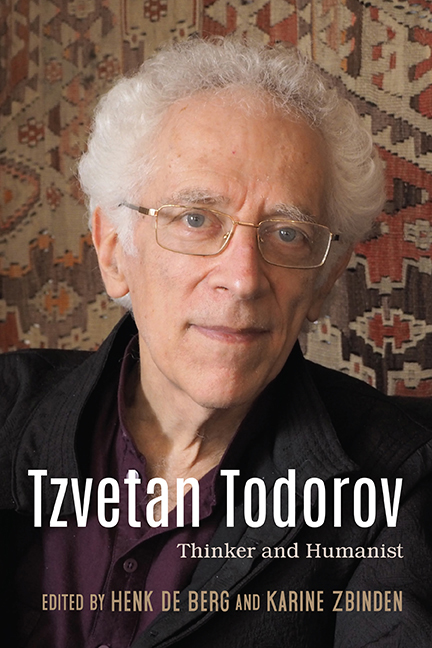Book contents
- Frontmatter
- Contents
- Acknowledgments
- Introduction
- 1 A Marginal Centrist: Tzvetan Todorov and the French Intellectual Field
- 2 Todorov and Camus
- 3 The Enlightenment Redux: Autonomy in Todorov, Glucksmann, and Onfray
- 4 Todorov's Reading of Rousseau: A Heritage for Our Times?
- 5 Tzvetan Todorov's Enlightenment
- 6 Todorov and Bakhtin
- 7 Tzvetan Todorov and the Writing of History
- 8 Tzvetan Todorov and the Trials of History: A Dissenting Voice
- 9 European Integration and the Cultural Cold War: Todorov and Denis de Rougemont
- 10 Tzvetan Todorov on Totalitarianism, Scientism, and Utopia
- 11 Tzvetan Todorov's Political Philosophy
- 12 Interview with Tzvetan Todorov
- Notes on the Contributors
- Index
3 - The Enlightenment Redux: Autonomy in Todorov, Glucksmann, and Onfray
Published online by Cambridge University Press: 26 April 2020
- Frontmatter
- Contents
- Acknowledgments
- Introduction
- 1 A Marginal Centrist: Tzvetan Todorov and the French Intellectual Field
- 2 Todorov and Camus
- 3 The Enlightenment Redux: Autonomy in Todorov, Glucksmann, and Onfray
- 4 Todorov's Reading of Rousseau: A Heritage for Our Times?
- 5 Tzvetan Todorov's Enlightenment
- 6 Todorov and Bakhtin
- 7 Tzvetan Todorov and the Writing of History
- 8 Tzvetan Todorov and the Trials of History: A Dissenting Voice
- 9 European Integration and the Cultural Cold War: Todorov and Denis de Rougemont
- 10 Tzvetan Todorov on Totalitarianism, Scientism, and Utopia
- 11 Tzvetan Todorov's Political Philosophy
- 12 Interview with Tzvetan Todorov
- Notes on the Contributors
- Index
Summary
SINCE THE TURN OF THE MILLENNIUM, and especially since September 11, 2001, in the face of violent sectarianism, globalized markets, international political instability, and European self-doubt, French intellectuals have looked to the disparate movement of the Enlightenment both for possible explanations of our current situation and for the critical tools with which to analyze it. This is the Enlightenment redux of my title— particular visions of the Enlightenment “brought back” or “restored.” To establish what is at stake in these divergent interpretations of eighteenthcentury thought, this chapter will examine a number of recent works by three major contemporary French thinkers—Tzvetan Todorov, André Glucksmann, and Michel Onfray. Specifically, the chapter will explore the different ways in which the concept of autonomy—a fundamental Enlightenment legacy—is configured in their works. In keeping with the theme of this volume, it is Todorov's views that will be the primary focus of our analysis.
Todorov (1939–2017) and Glucksmann (1937–2015) were recognized figures of the French intellectual scene since the late 1960s, while Onfray (b. 1959) has established himself as a significant public presence in philosophical and political debate over the past decade. Todorov began as a structuralist literary theorist before developing his critique of various forms of totalitarianism, racism, ethnocentrism, and imperialism. Underpinning this later research was an understanding of (French) humanist thought as an internal check on the extremist temptations of political regimes from the early modern period to the present. His position was largely that of a “middle-of-the-road” proponent of liberal democracy. Initially seduced by the Maoism of the late 1960s, André Glucksmann started out as a Marxist activist, but in the 1970s performed a volteface and—as one of the nouveaux philosophes—became a vocal critic of authoritarian and totalitarian regimes, most notably those of the Soviet bloc. From the late 1990s until his death, he advocated a market-friendly form of liberalism and was a staunch defender of human rights—a stance that did not prevent him from supporting increasingly interventionist neoconservative policies in foreign affairs. By contrast, Michel Onfray, a philosopher heavily influenced by Nietzsche, is a militant atheist, hedonist, and materialist whose politics are fundamentally libertarian.
- Type
- Chapter
- Information
- Tzvetan TodorovThinker and Humanist, pp. 55 - 73Publisher: Boydell & BrewerPrint publication year: 2020



